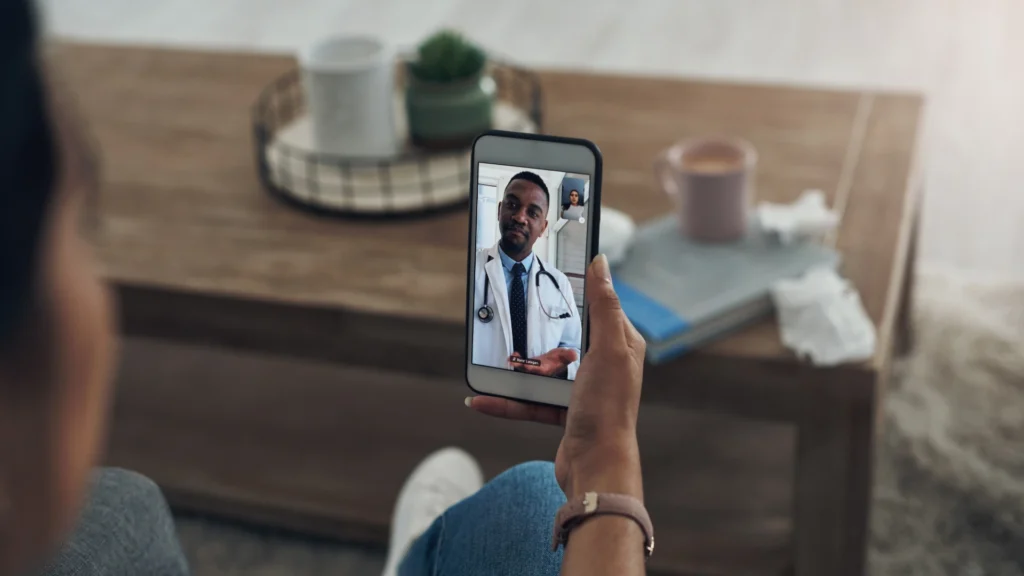-
Post-COVID Health Anxiety: Virtual Care Solutions Malaysia
-
The Hidden Scars of the Pandemic
-
When Avoidance Becomes Dangerous
-
The Mental Health Connection
-
How Virtual Consultations Are Changing the Game
-
Building Confidence Through Gradual Exposure
-
Creating a Balanced Approach to Healthcare
-
Practical Steps Forward
-
Moving Forward with Confidence

The sight of a hospital or clinic entrance still makes Sarah’s heart race. Three years after the pandemic began, this Kuala Lumpur marketing executive finds herself postponing routine check-ups and avoiding medical appointments whenever possible. “Every time I think about stepping into a clinic, I remember those scary days when hospitals were overwhelmed,” she shares. Sarah isn’t alone—countless Malaysians are experiencing post-COVID health anxiety that’s keeping them away from essential healthcare.
This lingering fear represents more than just temporary discomfort. It’s a genuine psychological response that’s affecting how we approach our health and wellbeing. Understanding why this happens and exploring practical solutions, including how telehealth Malaysia services can help, is crucial for moving forward confidently with our healthcare needs.
The Hidden Scars of the Pandemic
The COVID-19 pandemic fundamentally changed how Malaysians view healthcare settings. What were once routine visits to the doctor became potential exposure risks. The constant news coverage of overwhelmed hospitals, the sight of healthcare workers in full PPE, and the general atmosphere of fear created lasting impressions that many of us carry even today.
Pandemic healthcare fears manifest in various ways. Some people experience physical symptoms like increased heart rate, sweating, or nausea when approaching medical facilities. Others find themselves making excuses to delay appointments or avoiding preventive care altogether. This avoidance behaviour, while understandable, can lead to more serious health complications down the road.
The psychological impact extends beyond just fear of infection. Many Malaysians developed anxiety around the medical system itself—worried about being judged for delaying care, concerned about the quality of treatment during busy periods, or simply feeling overwhelmed by new safety protocols and procedures.
When Avoidance Becomes Dangerous
Delaying healthcare isn’t just about missing routine check-ups. For many Malaysians, post-COVID health anxiety has led to postponing important screenings, skipping follow-up appointments for chronic conditions, and avoiding seeking help for new health concerns. This avoidance cycle can transform minor health issues into major problems.
Consider Ahmad from Penang, who delayed his diabetes monitoring appointments for eight months because he was afraid of visiting the clinic. When he finally went, his blood sugar levels had deteriorated significantly, requiring more intensive treatment than would have been necessary with regular monitoring. His story reflects a broader pattern affecting thousands of Malaysians who are prioritising their fear over their health needs.
The ripple effects extend to families as well. Parents who experience pandemic healthcare fears may also delay bringing their children for routine vaccinations or health screenings, potentially impacting the entire family’s wellbeing. This creates a concerning cycle where healthcare avoidance becomes normalised within households.
The Mental Health Connection
Healthcare anxiety after COVID isn’t just about physical health—it’s deeply connected to our mental wellbeing. The stress of avoiding necessary medical care creates its own psychological burden. Many people report feeling guilty about postponing appointments, anxious about potential health problems they might be missing, and frustrated with their inability to overcome these fears.
This creates what psychologists call an “anxiety spiral”—the more we avoid healthcare, the more anxious we become about our health status, which makes us even more likely to continue avoiding medical care. Breaking this cycle requires both understanding and practical solutions that address the root causes of our fears.
The social stigma around mental health in Malaysian culture can make these issues even more challenging. Many people feel embarrassed about their healthcare anxiety, viewing it as a sign of weakness rather than a natural response to an unprecedented global crisis. This shame can prevent people from seeking help or discussing their concerns openly with family and friends.

How Virtual Consultations Are Changing the Game
Fortunately, technology offers promising solutions for those struggling with healthcare anxiety. Virtual consultations have emerged as a game-changer, allowing Malaysians to access medical care from the comfort and safety of their own homes. This approach addresses many of the specific fears that developed during the pandemic while maintaining the quality of care patients need.
Telehealth Malaysia services have expanded significantly since 2020, offering everything from routine consultations to specialist appointments through digital platforms. These services eliminate the need to visit crowded waiting rooms, reduce exposure concerns, and provide a more relaxed environment for discussing health concerns.
The benefits extend beyond just convenience. Many patients find that they’re more open and honest about their symptoms when speaking with healthcare providers through video calls from their own homes. The familiar environment reduces anxiety and allows for more effective communication between patients and doctors.
For those dealing with post-COVID health anxiety, virtual consultations provide a gentle bridge back to regular healthcare. They offer the medical attention people need while respecting their comfort levels and addressing their specific concerns about traditional healthcare settings.
This is where innovative platforms like FEV3R are making a real difference for Malaysian families. FEV3R’s comprehensive healthcare subscription service includes easy access to virtual consultations with qualified medical professionals, allowing users to address their health concerns without the stress of visiting physical clinics. The platform’s user-friendly interface and focus on making healthcare accessible aligns perfectly with the needs of those experiencing pandemic healthcare fears, providing a practical solution that prioritises both health and peace of mind.
Building Confidence Through Gradual Exposure
While telehealth Malaysia services provide excellent immediate solutions, gradually rebuilding confidence in traditional healthcare settings is also important for long-term wellbeing. This doesn’t mean forcing yourself into uncomfortable situations, but rather taking small, manageable steps toward normalising healthcare interactions.
Start with low-stakes appointments like routine check-ups or vaccinations during less busy periods. Many clinics now offer appointment scheduling that allows you to choose quieter times, reducing crowds and wait times. This can help ease the transition back to in-person care while maintaining the safety measures that provide peace of mind.
Consider bringing a trusted friend or family member to appointments if it helps reduce anxiety. Having social support during medical visits can significantly improve comfort levels and help you feel more secure throughout the process. Many healthcare providers are understanding of these needs and will accommodate reasonable requests for support.
Creating a Balanced Approach to Healthcare
The goal isn’t to choose between traditional and digital healthcare, but to create a balanced approach that meets your specific needs and comfort levels. Some health concerns are best addressed through in-person examinations, while others can be effectively managed through virtual consultations. Understanding when each approach is most appropriate empowers you to make informed decisions about your care.
For routine follow-ups, medication management, and many common health concerns, digital platforms offer excellent alternatives. However, certain screenings, physical examinations, and diagnostic procedures still require in-person visits. The key is using technology to reduce unnecessary exposure while ensuring you receive comprehensive care when needed.
Mental health after COVID considerations should also factor into your healthcare decisions. If your anxiety about medical settings is significantly impacting your life or preventing you from receiving necessary care, consider speaking with a mental health professional who can provide strategies for managing these concerns effectively.
Practical Steps Forward
Overcoming post-COVID health anxiety requires patience, understanding, and practical strategies. Start by acknowledging that your feelings are valid and shared by many others. This isn’t about weakness or irrationality—it’s a natural response to an extraordinary situation that affected everyone differently.
Create a healthcare plan that incorporates both digital and traditional services based on your comfort level and medical needs. Use telehealth Malaysia services for consultations that don’t require physical examination, and gradually work toward in-person visits for care that requires hands-on assessment.
Communicate openly with your healthcare providers about your concerns. Most medical professionals understand the impact of the pandemic on patient anxiety and are willing to work with you to find solutions that address both your health needs and your comfort levels. This might include longer appointment times, detailed explanations of safety protocols, or flexible scheduling options.
Moving Forward with Confidence
The path forward involves recognising that healthcare anxiety after COVID is a temporary challenge that can be overcome with the right approach and support. By combining the convenience and safety of digital health services with gradual re-engagement with traditional healthcare, Malaysians can rebuild their confidence in accessing medical care.
Remember that prioritising your health isn’t just about addressing immediate concerns—it’s about maintaining your long-term wellbeing and quality of life. Every small step toward normalising healthcare interactions is progress worth celebrating.
The pandemic may have changed how we approach healthcare, but it doesn’t have to permanently limit our access to quality medical care. With understanding, patience, and the right tools, we can overcome these challenges and maintain the healthy, confident lives we deserve.
Whether through virtual consultations, gradual exposure to traditional settings, or a combination of both approaches, the important thing is taking action to address your health needs. Your wellbeing matters, and there are compassionate, effective solutions available to help you move forward with confidence.
Contact Us






